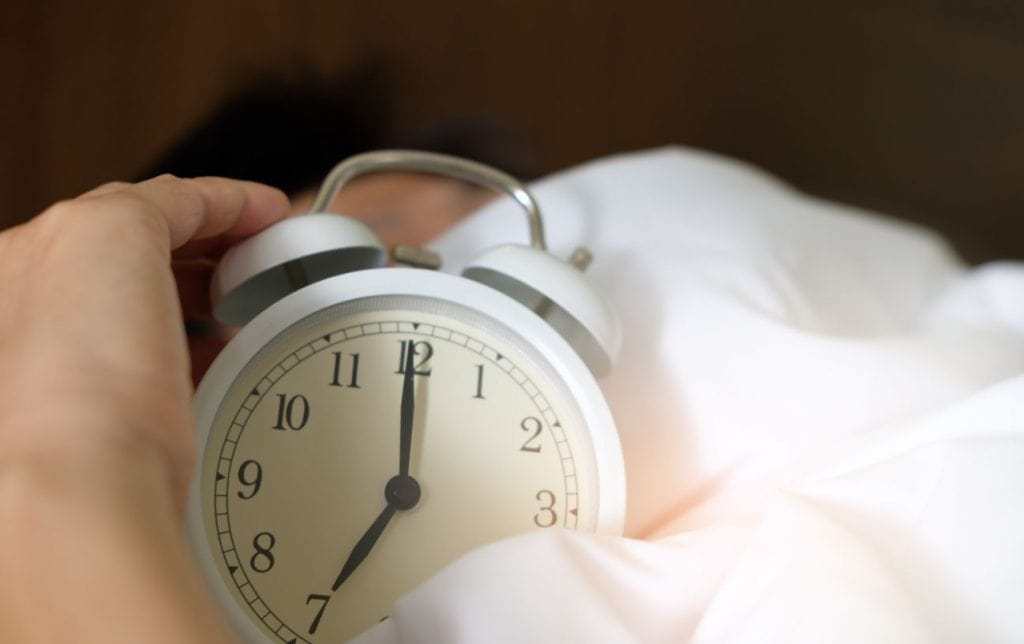Here is the dilemma: your child is not sleeping at night for sufficient hours, or keeps waking up very early in the morning – and many times earlier than you!
Like many parents, you probably know the value of sleep, and want your child to sleep early and wake up late in the morning – without much fuss!
Well, assuming you have eliminated sickness as a reason for the disorder, and they’re quite a number, the answers to this problem are probably around the corner, if only you pay close attention.
Sleeping hiccups usually happen because of the lifestyle choices at home, the environment in the bedroom, and what you are doing WRONG as a parent!

If your child is not sleeping well enough or is up by 5.00 am, the following arguments could explain your predicament:
1. Your Child is Sleeping Too Early!
Wait a moment, is this even possible?
Yes, your child probably sleeps too early and is overreaching the total number of hours he is supposed to sleep.
We all know how far the pediatricians will go to drill the importance of sleep in our heads. ‘Let them sleep early‘, they say, ‘and for many hours‘, and we take the cue.
But maybe we are demanding too much sleep from children! Yes, sometimes your child will seem to sleep for more hours than usual, and sometimes for only a bare minimum.
Question is, how many hours should children sleep? Secondly, how early is too early to sleep, and when is it too early for them to wake up?
Whereas an infant is comfortable sleeping for the most part of the night, a 7-year-old child will find it hard to stretch from 7.00 pm to 7.00 am. Sometimes 9.00 pm is also too early.
According to the National Library of Medicine, the following sleep guidelines should apply for children up to 18 years.
| Years | Hours |
| 0 – 1 | 14 – 17 |
| 1 – 3 | 12 – 14 |
| 3 – 5 | 10 – 13 |
| 6 – 11 | 8 – 11 |
| 12 – 19 | 8 – 10 |
Kids up to 12 months can go to sleep as early as 7.00 am, and sleep way beyond 7.00 am, without much of a fuss. They will understandably wake up every 2 to 3 hours to feed. But then dive back into sleep soon after.
On the other hand, your 7-year-old child may wake up as early as 4.00 am if he slept at 7.00 pm! He will only wake up at 7.00 am if he slept at 9.00 or even 10.00 pm.
Of course, there is the matter of growth spurts to consider, which will make your child sleep a little longer, every now and then. The extended sleep hours during these days allow the body to grow in height and weight.
2. Your Child Naps During the Day
While the 1-year-old baby will nap consistently during the day and sleep at night without a problem, the case is different with your 7-year-old child.
At 7, children are wired to stay active while playing and attending school during the day. The more active and productive they are, the more likely they will sleep better and for long hours during the night.
If, however, napping is an option in the afternoon, the sleep pattern gets a beating. According to a group of researchers,
Previous studies have demonstrated that afternoon naps can have a negative effect on subsequent nighttime sleep in children… There was a significant negative correlation between nap duration and both nighttime sleep duration and sleep onset time, suggesting that long nap sleep induces short nighttime sleep duration and late sleep onset time.
Your child will probably sleep for 7 hours at night, and even less, after taking a 3-hour nap during the day.
3. Lack of Physical Activity During the Day
Lack of physical wellness in children will leave them dull and sleepy during the day, and strangely, wide-eyed at night!
Sufficient playtime will naturally tire the children, and the urge to sleep will be too strong the moment they enter their beds.
Inactivity can also lead to obesity, diabetes, cardiovascular complications, poor attention span, and general body weakness.
Lack of physical wellness in children also contributes to low bone density, according to the Center for Disease Control and Prevention.
Ensure your child receives the necessary physical wellness at home and at school to achieve the following:
- Brain development and sharpness
- Fighting depression and anxiety
- General mental wellness
- Correct bone development
- Good and quality sleep at night
And just as well, your child’s physiology will find good reason to sleep well at night.
4. Soda and Junk Before Bedtime!
Unnecessary consumption of sweetened beverages will affect the sleep-wake cycle in children more than even alcohol. Of course, children do not take alcohol!
Too much sugar intake will interfere with the quality of sleep at night, because the hormones in the body receive mixed signals.
Many popular drinks are caffeinated and designed to keep the body awake, instead of sleeping. They prepare the body for an activity of sorts, which is not what we want to do at night!
According to Science Direct,
Short sleep is associated with a greater intake of sugared caffeinated sodas, a relationship that may have important, though unrecognized, implications for physical health …
Although caffeinated drinks could account for impaired sleep, it is possible that short sleep could influence one’s appetitive drive for sugared caffeine drinks.
On their own, consumption of sweetened beverages leads to obesity, which in itself denies your child quality sleep. They also lead to cavities, type 2 diabetes, and other complications.
Extensive consumption of junk food before sleep can wrongly stimulate the working of the hormone called insulin.
... how!
How this works is that the body will quickly burn the ingested sugars and soon after, say an hour or so, demand more glucose. This will leave the child hungry in a short time.
In the event a child has eaten only JUNK, he or she will be hungry even before jumping into bed. The routine will repeat itself in the night if junk is served repeatedly, and will necessitate continuous feeding. This is bad for digestion, and of course, interferes with sleep quality.
Conventionally, children should eat the RIGHT food an hour or two before jumping into bed.
5. Noise Pollution in the Bedroom
Sleep and noise are not good bedfellows. Noise has become part of our lifestyle as urbanization becomes the norm all around the world.
Noise pollution from heavy machines, cars, and other sources will interfere with child sleep at night. The noise will fail them from reaching the Rapid eye movement stage in sleep.
This will eventually disrupt the Rem and Non-Rem sleep stages, crucial for development in children.
According to Science Direct,
Nocturnal environmental noise also provokes measurable biological changes in the form of a stress response, and clearly affects sleep architecture, as well as subjective sleep quality.
Get rid of noise pollution by doing the following:
- Switch off entertainment systems in the house when children go to sleep. If possible, ask your neighbors to do the same
- Change the bedroom location or housing to a quiet neighborhood if noise is not manageable
- Take your children for hearing checkup every now and then if you EVEN suspect hearing problems – if you live in a noisy environment
It is incumbent upon parents to ensure children get noise-less sleep most of the time.
6. Technology in the Bedroom
Technology is no doubt good for children in the 21st Century. There is no way they can live without playing games, watching their favorite cartoons, and of course, connecting with friends through the digital ecosystem.
But excess consumption of technology exposes them to plenty of health and social side effects.
Bad use of technology can be the reason your child is not sleeping at night. Technology devices emit the blue light in the bedroom which may lead to the following:
- Suppresses the release of melatonin which is crucial in regulating the sleep-wake cycle
- Delays the REM sleep
- Keep the mind alert because of the stimulation from the engagement with the screen
Do not allow children to sleep with cell phones, game consoles, computers, and other devices that may distract their sleep. As a parent, lead by example by not abusing technology.
7. EMF Interference
Technology devices also contribute to the increase in electromagnetic radiation emission in the bedroom.
This could also be the reason your baby is not sleeping at night. The effect of EMF on children is more dramatic since their brains are still developing, and therefore fragile and tender. This makes them more vulnerable to the penetrative effect of electromagnetic radiation.
EMF in the bedroom is present in four forms, according to Dr. Mercola and other sources:
- Radiofrequency fields (RF) are emitted by cell phones, Wi-Fi, Bluetooth, smart meters, wireless devices, etc.
- Electric fields are created from electric wiring, power sockets & connections, power cables with two prongs instead of three, etc.
- Dirty electricity is created from transient energy devices such as energy saver bulbs, mobile power banks, dimmer switches, etc.
- Magnetic fields are emitted by poor electrical wiring, overhead power lines, current on grounding systems, etc.
If there is extreme emission of EMF inside the bedroom, you and your child may experience one or most of the following side effects:
- Headache
- Memory issues
- Hearing problems
- Sight problems
- Sleep disorder
You may want to do the following if your baby is not sleeping at night:
- Do not keep computers and cell phones in your child’s bedroom
- Remove Wi-Fi devices in the bedroom
- Do not allow electronic charging in the bedroom
- Avoid overhead power line on top or near the bedroom
- Do not use energy-saver bulbs
- Get rid of dimmer switches
- Get rid of poor grounding
8. Fear of Sleep!
The fear of sleep, also known as somniphobia, can indeed cause a child to develop a fear of sleeping at night. This fear can stem from various factors and may manifest in different ways for each child. Here are a few ways in which the fear of sleep can impact a child’s bedtime routine:
- Nightmares or bad dreams: If a child frequently experiences nightmares or unsettling dreams during sleep, they may develop a fear of falling asleep. The fear arises from the anticipation of having another scary dream, leading the child to associate sleep with negative experiences.
- Anxiety or separation anxiety: Children who experience anxiety or separation anxiety may feel distressed when separated from their parents or caregivers, particularly at night. They may fear being alone in the dark, leading to resistance or reluctance when it comes to sleep.
- Fear of the unknown: Children have active imaginations, and their fear of sleep can be triggered by the unknown or unfamiliar aspects of nighttime. They may fear what happens while they are asleep, such as monsters, ghosts, or other imagined dangers lurking in the darkness.
- Traumatic experiences: If a child has experienced a traumatic event, such as a car accident, a loss, or a frightening incident, they may develop a fear of sleep as a result. Sleep can be associated with vulnerability, and the child may fear re-experiencing the trauma or having nightmares related to it.
- Sleep disturbances or disorders: Certain sleep disorders, such as sleepwalking, sleep paralysis, or night terrors, can be unsettling for both the child and their parents. If a child has frequent episodes of these sleep disturbances, they may develop a fear of sleep due to the uncertainty and fear associated with these experiences.
9. High Levels of Cortisol Hormone
Cortisol, often referred to as the stress hormone, can disrupt sleep in children in a few key ways:
- Interrupted Sleep Cycle: Cortisol plays a natural role in our sleep-wake cycle. Ideally, cortisol levels should be low in the evening to promote sleepiness and then rise gradually in the morning to wake us up. However, chronic stress or high-stress situations can cause cortisol levels to remain elevated at night. This disrupts the natural sleep cycle, making it difficult for children to fall asleep or stay asleep throughout the night.
- Increased Alertness: Cortisol prepares the body for action, which is helpful in a stressful situation. But at night, this heightened alertness can make it hard for children to wind down and relax. Their minds may race with worries, keeping them awake.
- Trouble Calming Down: Cortisol dampens the effectiveness of melatonin, a hormone that helps regulate sleep. This makes it harder for children to quiet their minds and achieve a state of calmness needed for sleep.
- Fragmented Sleep: Even if children fall asleep with high cortisol levels, they may experience more frequent awakenings during the night. This fragmented sleep leaves them feeling tired and unrested in the morning.
- Stressful Dreams: Elevated cortisol can contribute to vivid or even nightmares. These can further disrupt sleep and make it difficult to return to restful sleep after waking up.
The Cycle Continues: Poor sleep due to high cortisol can then worsen stress levels, creating a vicious cycle. A child who is sleep-deprived is more likely to feel stressed and irritable, further elevating cortisol and making it even harder to sleep well.
Your child is not sleeping at night because of these other reasons:

- Poor sleeping conditions
- Extreme temperature in the bedroom
- Depression and anxiety
- Health conditions such as headache





Leave a Reply